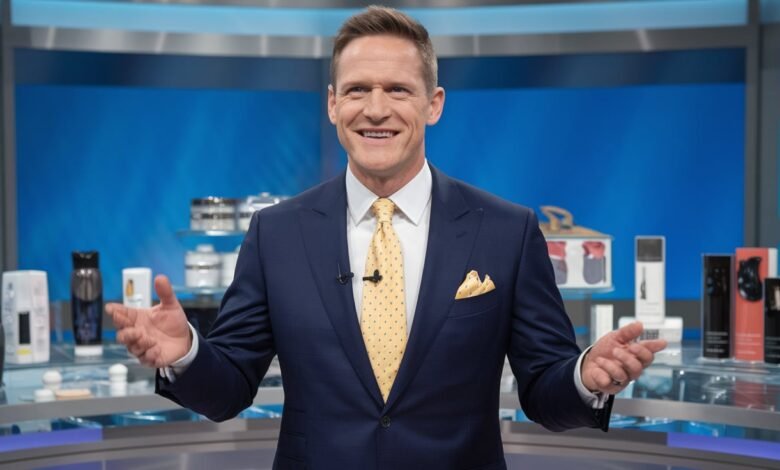The Most Disliked Host on QVC: Unpacking Controversy and Viewer Opinions

Introduction to QVC and Its Hosts
Most Disliked Host on QVC, short for Quality Value Convenience, is a prominent television shopping network that has significantly influenced the retail landscape since its inception in 1986. As a pioneer in the home shopping industry, QVC revolutionized how consumers access and purchase products, combining the convenience of television broadcasting with the immediacy of direct sales. QVC offers a diverse array of merchandise, ranging from fashion and beauty products to home goods and electronics, showcased through engaging presentations that encourage viewers to make immediate purchases.
At the core of QVC’s unique shopping experience are its hosts, who play a vital role in connecting with the audience. These individuals possess strong communication skills and an intrinsic understanding of retail dynamics, enabling them to present products in an appealing manner. Hosts engage with viewers by demonstrating product features, answering questions, and sharing personal anecdotes that create a relatable atmosphere. Their charisma and ability to build rapport are crucial components of QVC’s competitive edge, driving viewer loyalty and sales.
While many hosts have garnered a substantial following, there exists a notable contrast in viewer perceptions. Some hosts resonate well with the audience, earning their affection and respect, whereas others have sparked criticism and controversy. The idea of the most disliked host on QVC comes into play when discussing audience reactions and how certain hosting styles do not align with viewer expectations. This phenomenon highlights the subjective nature of televised shopping and the varied opinions that can emerge amongst consumers. Understanding these dynamics is essential for unpacking the complexities surrounding QVC hosts, paving the way for discussions on viewer opinions and the implications of being labeled the most disliked host on QVC.
Who is the Most Disliked Host on QVC?
As discussions about television shopping networks like QVC evolve, a prominent figure often evokes mixed responses—mistakenly labeled as the most disliked host on QVC. This title is frequently attached to Lisa Robertson, a former host who gained significant popularity during her tenure. Born in 1965, Robertson began her career in local television before making her way to QVC in 1995. Over the years, she became known for her charismatic presentation style, rapport with viewers, and an extensive knowledge of the products she showcased.
Throughout her time on the network, Robertson played a crucial role in elevating QVC’s brand and was celebrated for introducing innovative products to the public. She engaged audiences with her genuine enthusiasm and captivating storytelling. Key moments during her career include her role in the launch of several fashion lines and her successful hosting of various themed shows, making her a household name. Despite these accolades, the sentiment surrounding her evolved into a mixed bag, leading some viewers to express their strong feelings of discontent.
The reasons for her classification as the most disliked host on QVC can be attributed to numerous factors. Critics have pointed to her bold personality, which, while appealing to many, also alienated parts of the audience. Personal style choices and on-air comments were occasionally perceived as out of touch, causing further division among viewers. Additionally, as she transitioned away from QVC in 2014, some fans felt a sense of betrayal, leading to negative sentiments regarding her legacy on the platform. Thus, while Robertson remains a significant figure in QVC history, the complexity of viewer reactions continues to spark debate regarding her standing, underscoring the nuances of audience loyalty and dissent.
Factors Behind Disliking: Viewer Perspectives
The dynamic world of television shopping, particularly on platforms like QVC, often elicits strong opinions from viewers regarding its hosts. A notable phenomenon observed among audiences is their tendency to gravitate towards or away from certain on-screen personalities. In this context, the most disliked host on QVC has drawn significant viewer critique, which stems from various fundamental factors that contribute to negative perceptions.
One of the primary issues frequently raised by viewers is the presentation style of the host. Many have expressed dissatisfaction with hosts who utilize overly aggressive sales techniques, often perceiving them as insincere or pushy. This approach can lead to a disconnection between the audience and the host, ultimately resulting in a decline in trust. Moreover, when hosts fail to engage audiences with authentic enthusiasm or warmth, it can further alienate viewers, compounding their discontent. The most disliked host on QVC may be a prime example of this backlash against a perceived lack of genuine engagement.
Personality traits also play a pivotal role in shaping viewer opinions. Audiences often favor hosts who are relatable, charismatic, and possess a good sense of humor. In contrast, a host who comes across as cold, arrogant, or overly self-important may quickly become the focus of viewer disdain. Additionally, certain on-screen behaviors, such as interrupting guests or dismissing viewer questions, can exacerbate negative feelings, leading to widespread criticism. The feedback surrounding the most disliked host typically highlights these attributes, suggesting a failure to connect with the core values that resonate with the audience.
Ultimately, these multifaceted factors—ranging from presentation style to intrinsic personality traits—collectively contribute to the viewer’s perception of hosts on television shopping networks, particularly in identifying those deemed least favorable.
Controversies and Criticisms Facing the Host
In the realm of television shopping networks, few individuals have managed to garner as much attention—both positive and negative—as the most disliked host on QVC. This host’s tenure has been marred by a series of controversies that have sparked significant backlash from both viewers and industry critics alike. Notable incidents have included on-air gaffes, insensitivities relating to product descriptions, and sometimes controversial remarks that have not sat well with the audience.
One particularly striking incident occurred during a live segment where the host made an offhand comment that many viewers perceived as insensitive, leading to widespread criticism across social media platforms. This incident drew attention not just to the host but also to QVC’s overall brand image and viewer trust. The host’s remarks ignited a firestorm of discussion, prompting several viewers to take to platforms like Twitter to express their displeasure and dissatisfaction, suggesting that QVC reconsider the future of this host. As a result, QVC has faced increasing pressure to either address the host’s behavior or possibly reevaluate their role within the network.
This series of controversies has undoubtedly impacted the host’s reputation. Viewership ratings during their segments have fluctuated, with many loyal customers opting to tune out, fearing that they might encounter more discomforting dialogue. Additionally, the internet has seen a rise in critique, with various online forums discussing not only the incidents but also the host’s perceived inability to connect with the audience on a personal level.
These ongoing issues have contributed to the perception of the most disliked host on QVC. While this individual continues to hold a position on the network, the controversies surrounding their conduct raise significant concerns about their future and the potential effects on both audience engagement and QVC’s brand integrity.
Comparative Analysis: Other QVC Hosts
Understanding the dynamics of viewer preferences on QVC requires a careful examination of the personalities that occupy this popular shopping platform. While the most disliked host on QVC has stirred significant controversy and polarizing opinions, it is essential to contrast this figure with other well-received hosts who have garnered positive viewer reception. Various attributes contribute to a host’s likability, and a comparative analysis reveals why some resonate with the audience while others do not.
Charisma and authenticity often set successful QVC hosts apart. For instance, hosts who exhibit genuine passion for the products they present tend to build a loyal viewer base. This authenticity creates an engaging shopping experience, making viewers feel connected to the host and more likely to make purchases. In contrast, the most disliked host on QVC has been criticized for a perceived lack of enthusiasm and connection, which has detracted from their ability to foster viewer loyalty.
Moreover, communication style plays a crucial role in a host’s reception. Hosts who employ a warm, relatable, and conversational tone are often more successful. They invite viewers into the shopping experience rather than presenting a cold, transactional interaction. This approach contrasts sharply with the style of the most disliked host, who may use a more authoritative or abrasive tone that alienates certain segments of the audience.
Additionally, how hosts handle viewer inquiries and interactions further influences their perception. Top hosts emphasize customer engagement on social media platforms, creating a sense of community and transparency. Conversely, the most disliked host on QVC has been noted for less effective engagement strategies, negatively affecting viewer perceptions. This comparative analysis highlights critical traits that can either enhance or diminish a host’s appeal in the competitive landscape of QVC.
The Impact of Social Media on Viewer Sentiment
In recent years, social media platforms have emerged as powerful tools for shaping viewer opinions, particularly concerning figures in the public eye, such as television hosts. The most disliked host on QVC has become a focal point for discussions among viewers, prompting a wide spectrum of sentiments shared on platforms like Twitter, Facebook, and Instagram. These spaces not only facilitate the expression of individual perspectives but also amplify collective sentiments towards these personalities.
As viewers engage in discussions online, they often share personal anecdotes or reactions to QVC programming, significantly influencing public perception. For instance, trending hashtags related to the most disliked host on QVC can quickly gain traction, drawing attention and encouraging users to contribute their thoughts. Posts that criticize or support the host can rapidly accumulate likes and shares, creating a ripple effect that resonates with others. This collective action often leads to a heightened awareness of the prevailing opinions surrounding the host, as viewers may feel compelled to join in the conversation or reevaluate their own views based on the sentiments expressed by others.
Moreover, online communities formed around QVC-related discussions provide a platform for various opinions to converge. This communal environment shapes perceptions of the most disliked host on QVC, as members often share criticisms or accolades in a safe space where they feel their opinions will be valued. The feedback loop created by these interactions can lead to either a growing disdain or an unexpected support for the host, ultimately affecting their standing in the public eye.
In conclusion, social media plays a vital role in crafting and reflecting viewer sentiment regarding the most disliked host on QVC. By fostering open dialogue and facilitating swift dissemination of ideas, these platforms significantly impact how audiences perceive and interact with QVC programming.
Responding to Viewer Sentiment
QVC, a major player in the retail home shopping network industry, has experienced its share of controversies surrounding its hosts, including instances involving the most disliked host on QVC. In light of these controversies, the network has adopted a careful approach to addressing public sentiment and viewer dissatisfaction. When negative opinions or experiences related to a host surface, QVC tends to prioritize transparency and outreach, making it essential to communicate with its audience. This often involves issuing statements or engaging directly with viewers on social media platforms.
Measures and Adjustments
In some cases, QVC has responded to viewer concerns by implementing changes to the roles or presence of certain hosts. This may include reducing a host’s on-air time or providing additional training aimed at improving viewer interaction. By making these adjustments, QVC seeks to realign the on-air experience with viewer expectations, particularly when dealing with sentiments directed at the most disliked host. The network’s primary focus remains its audience’s satisfaction, and thus they are willing to make necessary changes based on prevailing viewer feedback.
Public Relations Strategy
The company’s handling of public relations during controversies showcases its commitment to maintaining a positive image. QVC often utilizes various channels to promote its message and convey its commitment to customer satisfaction. In tackling negative sentiments, the network has embraced proactive communication strategies such as highlighting customer testimonials and success stories. This enables QVC to draw attention away from unfavorable feedback regarding the most disliked host and shift focus to its products and services. By investing in community building and engagement, QVC continually works to sustain its reputation amid criticism and evolving viewer perspectives.
Conclusion
In conclusion, QVC’s response to controversies and discontent related to its hosts, particularly the most disliked host on QVC, highlights the network’s commitment to viewer satisfaction and effective public relations. Through transparent communication, adjustments in host roles, and a proactive outreach strategy, QVC endeavors to maintain a positive relationship with its audience while addressing concerns in an ever-evolving market.
The Future for the Most Disliked Host
The trajectory of the most disliked host on QVC presents a complex narrative of potential career revival and viewer reception. As public opinion ebbs and flows, it remains to be seen whether this individual can cultivate a pathway towards redemption. The host’s attempts to engage with audiences who may harbor negative sentiments could play a critical role in shaping their future. Adaptive communication strategies, such as acknowledging past missteps and exhibiting a willingness to evolve, are essential to win back skeptical viewers.
Recent trends in viewer preferences indicate that audiences are increasingly seeking authenticity and relatability in hosts. Thus, if the most disliked host on QVC can align themselves with such expectations, there may be an opportunity for a successful resurgence. For instance, public responses to a shift in the host’s approach—perhaps through more genuine engagement during presentations—could foster a more favorable public image. Viewer loyalty is often tied to a host’s ability to resonate personally, presenting a chance for transformation should the host successfully recalibrate their style.
Moreover, industry trends toward inclusivity and diversity can also influence the acceptability of controversial figures within media platforms. As QVC continues to cultivate a broader range of hosts to appeal to varied audiences, the very dynamics that once made this host a polarizing figure could become less central. External factors, such as shifts in management or programming direction, may also affect opportunities, either bolstering or hampering chances for redemption.
Ultimately, the future for the most disliked host on QVC depends on a delicate interplay of self-awareness, viewer perception, and the evolving landscape of television shopping. As the host navigates these channels, audience sentiments will be pivotal in determining if they can forge a path towards regaining viewer support and revitalizing their career on the network.
Conclusion
The ongoing discussion surrounding the most disliked host on QVC serves as a poignant reminder of the critical relationship between television hosts and their audience. Throughout the various viewer opinions, it becomes evident that engagement and response to audience sentiment are crucial in the realm of televised shopping. The reactions to specific hosts highlight the fine line between effective presentation and viewer alienation, underscoring a need for constant evolution in hosting style and content delivery.
Understanding viewer perceptions can significantly impact a host’s ability to resonate with the audience. As demonstrated in the case of the most disliked host on QVC, personal appeal and connection play a vital role in shaping viewer loyalty and satisfaction. By paying attention to feedback, hosts and networks can adapt their strategies to better meet audience preferences, ultimately resulting in an enhanced shopping experience.
As viewers express their thoughts, whether in support or criticism, it is essential for television shopping networks to embrace these insights. The dialogue generated from these reactions provides valuable lessons not only for current hosts but also for upcoming talent in the industry. It’s clear that maintaining a responsive posture towards audience feedback can lead to improvement in both performance and viewer relations.
Thus, the situation around the most disliked host on QVC can serve as a launchpad for broader discussions about the dynamics of viewer engagement in television shopping. Continuous communication and adaptation based on viewer responses can create an environment where hosts thrive, and audience satisfaction is prioritized. As we move forward, it is vital for both hosts and networks to recognize the importance of this ongoing dialogue to foster a more favorable shopping experience for all.
You May Also Read This UsabizPro.




